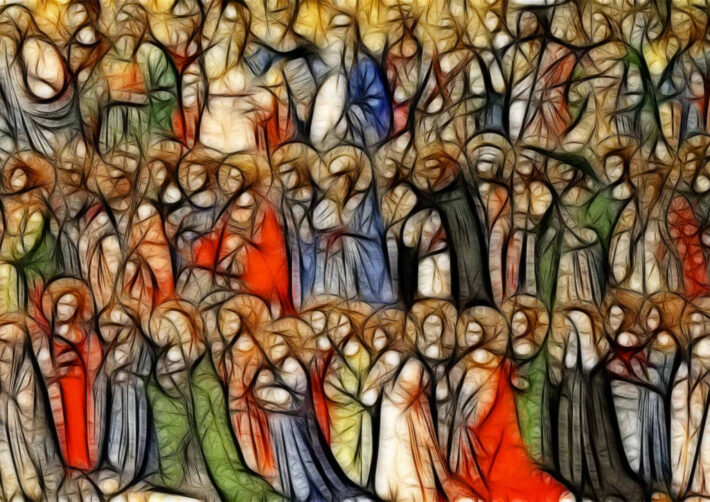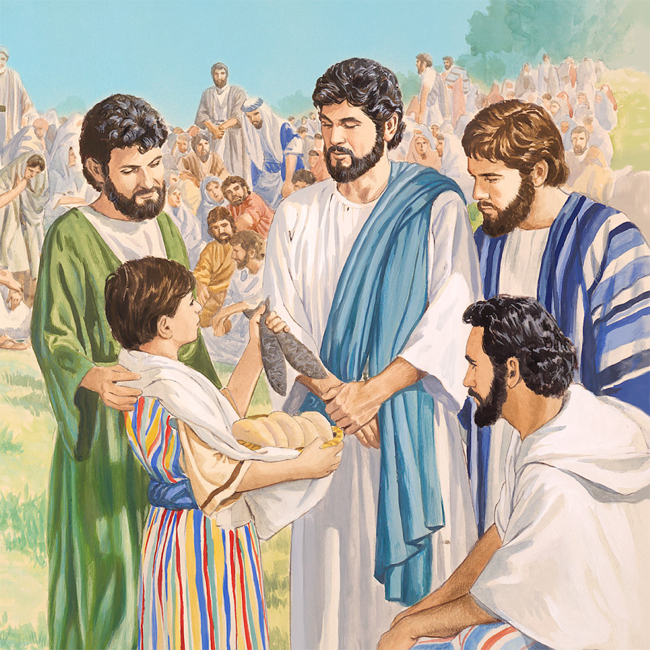Christian Art | Church Community | Powerful Prayer With Jesus | Revolution In Jesus Christ
Matthew 18: 15-20 – Week 19 Ordinary Time, Wednesday (King James Audio Bible KJV)
15 ¶ Moreover if thy brother shall trespass against thee, go and tell him his fault between thee and him alone: if he shall hear thee, thou hast gained thy brother.
16 But if he will not hear thee, then take with thee one or two more, that in the mouth of two or three witnesses every word may be established.
17 And if he shall neglect to hear them, tell it unto the church: but if he neglect to hear the church, let him be unto thee as an heathen man and a publican.
18 Verily I say unto you, Whatsoever ye shall bind on earth shall be bound in heaven: and whatsoever ye shall loose on earth shall be loosed in heaven.
19 Again I say unto you, That if two of you shall agree on earth as touching any thing that they shall ask, it shall be done for them of my Father which is in heaven.
20 For where two or three are gathered together in my name, there am I in the midst of them.
Within the Discourse on the Church, the Discourse of the Community, Jesus speaks of the ways in which we may recall our brothers and sisters to the truth path when perhaps there has been a straying. This is to say, Jesus speaks of fraternal correction, of how Christian communities should work to sanctify others, in such a way that those who have sinned may be most readily and with dignity recalled.
The first approach, Jesus tells us, is to be with great discretion. We don’t publicize the person’s trespass. That person is, after all, our brother or sister. We wish to protect everyone’s feelings, and a quiet word so often can do the trick. It may well be that the person does not even realise that there is a fault.
It is only when this quiet word aside does not work that we look to increase the amount of influence being brought to bear on the person at fault. This remains a friendly matter. It may well be that a person can see the reality of the matter more clearly when there are two or three others confronting him, rather than only one.
Finally, it becomes the task of whole community to intervene, and this includes the authority of the Church. Where there is grave sin and the sinner refuses correction, then he or she is to be excluded from Church life, i.e. excommunicated.
Jesus gives to his Church authority to judge such matters. This takes place within a loving context, as when two or three are gathered in Jesus’ name, then Jesus is with those people. Love, after all, implies relationship between people, with two or three or with a whole community. It is in this context that we are encouraged to acknowledge our failings in life, to thank God for His mercy, to confess our sins, and to be at one with our brothers and sisters in Jesus Christ.
Concluding Prayer
Lord, holy Father, faithful to your promise
you sent your Spirit
to bring together a people divided by sin.
Give us the grace to foster unity and peace among men.
Through Christ out Lord.

![]()
King James Audio Bible | Endnotes
Fraternal Love And Christian Community In The Gospels
At the heart of the Gospels is the call to love one another. In John 13:34-35, Jesus says, ‘A new commandment I give unto you, That ye love one another; as I have loved you, that ye also love one another. By this shall all men know that ye are my disciples, if ye have love one to another.’ Jesus’ call to love is foundational of Christian community, and it requires believers to care for one another and to support one another in our faith journey.
Throughout the Gospels, we see examples of how Jesus expressed his love and care for his disciples. He spent time with them, taught them, and demonstrated compassion and empathy towards them.
An example of Christian community in the Gospels is the story of the healing of the paralytic (Mark 2:1-12). In this story, a group of friends brings a paralyzed man to Jesus to be healed. When they are unable to reach Jesus because of the crowds, they lower the man through the roof of the house where Jesus is staying. Jesus is moved by their faith and heals the man. This story demonstrates the importance of community in supporting one another and working together to achieve a shared goal.
A further example of Christian community in the Gospels is the story of the feeding of the five thousand (Matthew 14:13-21). In this story, Jesus is moved by compassion for the people who have come to hear him speak, and he performs a miracle by feeding them with only five loaves of bread and two fish. This act of compassion and generosity brings the people together in a shared experience of community.
The Gospels highlight the importance of hospitality and shared meals in Christian community. In Luke 10:38-42, Jesus visits the home of Martha and Mary, who welcome him and provide him with food and a place to rest. This act of hospitality creates a sense of community and fellowship between Jesus and the two women.
The Last Supper is an expression of Christian community. Jesus gathers with his disciples to share a final meal on the eve of the Passion, and Jesus uses this opportunity to teach them about his impending death and the importance of loving one another. As Christians, we participate in the Last Supper when we accept communion, the Eucharist. This enacts the unity and fellowship that Christians share faith.
The Gospels emphasize the importance of forgiveness and reconciliation in Christian community. In Matthew 18:15-17, Jesus teaches his disciples about the process of reconciliation when a brother sins against them. This passage highlights the importance of communication and forgiveness in maintaining unity within the Christian community.
Finally, the story of the resurrection itself is a powerful example of Christian community. After Jesus’ death, his disciples come together to grieve and support one another. When Jesus appears to them after his resurrection, Jesus reaffirms their faith and strengthens their sense of community. The disciples go on to spread the message of the resurrection and build a vibrant community of believers.
Saint Augustine wrote extensively on the topic of Christian love and community. He stated: ‘In the Church, there is one common health, one common life, one common grace, one common redemption; one common faith; one common charity; one common hope; one common worship; one common Christ.’
Saint John Chrysostom emphasized the importance of forgiveness within Christian communities. He stated: ‘Let us not grieve one another; let us not judge one another; let us not stumble one another… If we are one in Christ, then let us also be one in love.’
The concept of Christian community and fraternal love is also reflected in modern Protestant theology. Dietrich Bonhoeffer, a German Lutheran theologian, wrote extensively on the importance of Christian community. He believed that Christian community was a reflection of the divine love that God has for us. He stated: ‘The Christian needs another Christian who speaks God’s Word to him. He needs him again and again when he becomes uncertain and discouraged, for by himself he cannot help himself without belying the truth.’
The Apostle Paul wrote extensively on the subject of Christian unity, urging believers to maintain the bond of peace and work together for the common good. In his letter to the Ephesians, he writes: ‘Make every effort to keep the unity of the Spirit through the bond of peace.’ (Ephesians 4:3)
In Catholic theology especially, the concept of unity is expressed through the idea of the communion of saints. This refers to the spiritual connection that exists between all members of the Church, both living and dead. It highlights the idea that all Christians are united in Christ and are called to support and encourage one another in our faith journey.








